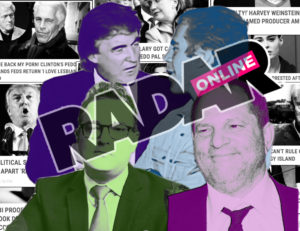Despite the millions of dollars that some of its sketchy, secretive investors ploughed into it, Radar Magazine failed to take off. But it’s not as if these guys got nothing for their money. Far from it. Being a member of the Radar Investors’ Circle has ended up having a few pretty nifty perks for those involved…
IV/ Art Of The Dyl
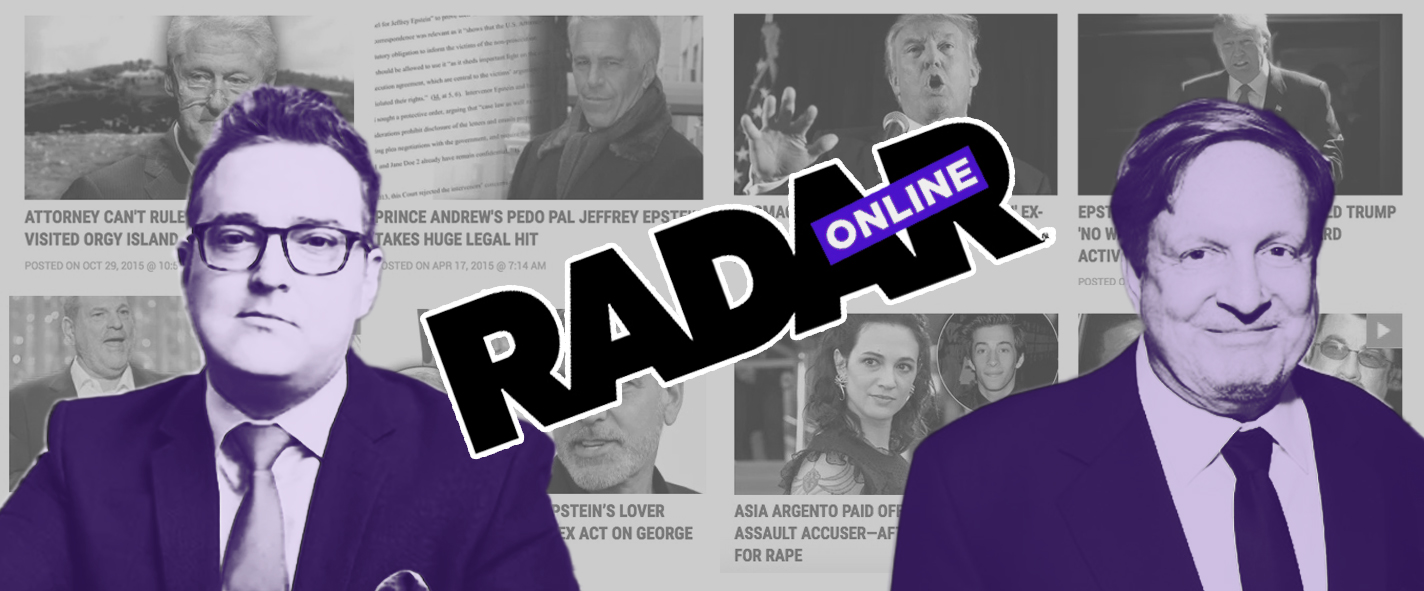

For obvious reasons, Ron Burkle doesn’t much care to be compared to his former friend Jeffrey Epstein.
His lawyers tend to get a little prickly at the suggestion too.
The sadly departed gossip site Gawker was issued with a legal demand to apologise to Burkle in 2006 when they first tried stacking up the similarities side-by-side. Given how much more disgraced Epstein has become in the years since then, we can only assume that the stakes are now even higher. But as this is a story about the early investors in Radar (which Jeffrey Epstein and Ron Burkle both were) sadly, comparisons between the two are going to be inevitable.
In order to nip any potential legal difficulties in the bud then, we want to make it perfectly clear from the start that we are not trying to imply anything improper about Ron Burkle’s taste in women here. Nor should you infer it. Though Burkle has shown a definite preference for women who are younger than him (in much the same style as his good friend Leonardo DiCaprio) the models that Burkle chooses to surround himself with have all been – to the best of our knowledge – of legal, consenting age.
Yes, Burkle may have run in the same circles as Jeffrey Epstein back at the turn of the century, attending multiple dinner parties at his Manhattan apartment.
Yes, the pair of them might have both owned private jets with unfortunate nicknames (Epstein’s “Lolita Express“; Burkle’s “Air Fuck One“).
Yes, Burkle was a passenger on the infamous flight that Epstein took to Africa, alongside prominent sex cases Kevin Spacey and Bill Clinton.
And, yes, the pair of them did both choose to invest in the snarky pop culture magazine Radar after enduring pronounced periods of unwelcome media attention into their private lives. But that’s where the similarities end, because their reasons for funding Radar were really rather different.
Esptein’s decision to invest came about because he was annoyed and alarmed by the coverage he was getting in serious society magazines like Vanity Fair and New York Magazine, but that’s not what drove Burkle to it.
The magazine that was getting under Burkle’s skin was completely different.
It was Radar.

Radar Detection
You’d be hard-pressed to describe Radar‘s second incarnation (the Epstein/Zuckerman funded re-launch in 2005) as a success. Not just because it folded after three issues, but because one of its primary investors was being investigated for sex crimes against minors for the entire eight months they managed to keep it afloat.
A literal May to December relationship.
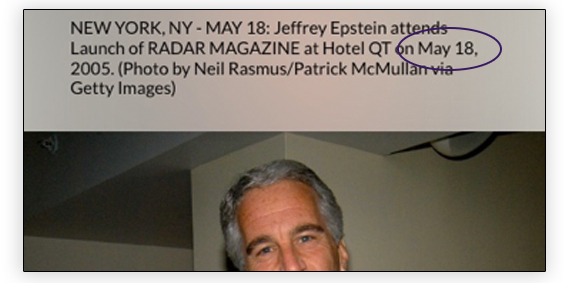
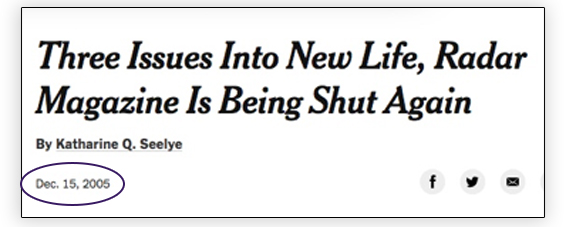
Still, Radar 2.0 wasn’t a complete failure. In its short life it did manage to come good on at least one of its stated aims. It set out to be an irritant to the rich and powerful, and that’s exactly what it ended up being to supermarket billionaire, Ronald “Ron” Burkle.
Ron had been having a bit of a rough time with media coverage in the mid-2000s. A lot of it stemmed from the acrimonious divorce between him and his wife in 2003 and the lengthy legal and legislative battle that he waged trying to get the 1,200 pages worth of papers sealed in court and kept from public view.
Then there were whispers about his close friendship and business ties to Bill Clinton, all of which kicked up a gear when the New York Post’s Page Six column alluded to flights that the former president was taking aboard a mystery billionaire’s private jet with a bevy of young, nubile models (which, in fairness, could have been a reference to either Burkle or Epstein…)
Gawker‘s aforementioned insistence on bringing up his name in close proximity to Epstein became especially annoying for him when the evidence that Jeffrey was a massive fucking danger really started to mount.
But it was reports of his relationship with a totally different sex offender that caused him to lose his rag with Radar.
In 2005, Radar reported that Burkle had invited Michael Jackson to stay aboard his luxury yacht, so that he could decompress and recover from all the stresses and strains that came with his child sex abuse trial that same year.
Burkle and Jackson had been friends. In fact, Burkle had been on hand throughout the trial to offer Michael advice over the phone during toilet breaks in the court proceedings. Jackson would later admit in a deposition that Burkle had indeed been a great source of support to him at that time – but Burkle, like Epstein before him, knew it was unwise to been seen harbouring alleged sex criminals on your private vessels.
So he put in a complaint, urging Radar to back the fuck off.
Actually, that’s not quite true. A busy billionaire like Burkle would never have the time to make a complaint like that himself. He had his friends do it instead.
First up, Burkle set his lawyer loose: the feared Hollywood litigator and self-styled Bulldog To The Stars, Marty Singer.
Singer (who we have written about elsewhere previously) is renowned in Hollywood circles for his aggressive, strong-arm tactics which have deployed at the behest of all manner of celebrities and socialites. He was the lawyer who managed to bust Jeremy Piven out of a seemingly iron-clad Broadway contract thanks to his sushi consumption. He secured a noise abatement order at the request of Quentin Tarantino, when Tarantino wanted his neighbour’s exotic birds silenced. He’s also done work for Arnold Schwarzenegger, Britney Spears, Kim Kardashian, Simon Cowell, Bill Cosby, John Travolta.
The list goes on…
Often, the threat of Singer alone is enough to get most magazines to play ball, but Burkle wasn’t taking any chances with this. To be extra sure, he had another pal of his place a personal call to Jeffrey Epstein to see if he could get Radar to lay off on his behalf.
That pal? Epstein and Burkle’s mutual, high-flying compadre… Bill Clinton!
Burkle wasn’t the only one complaining about his treatment in Radar either. Reports at the time suggested that Jeffrey Epstein and Mort Zuckerman’s phones were ringing off the hook with all their powerful friends calling up to chew them out about some injustice they had suffered at Radar‘s hand.
Still, pulling in favours like that is an awful lot of trouble to go to each and every time someone prints something unfavourable about you. And as any shady powerbroker worth their salt will tell you, it’s much easier to take care of this sort of problem in-house – by owning a controlling stake in the business.
Which is exactly what Burkle ended up doing.
Shortly after Mort Zuckerman cut his losses and left Radar 2.0 (supposedly in part to help distance himself from the scandals surrounding his gigantic paedophile of a co-investor) Burkle stepped into the breach and helped put together a new funding package for Radar 3.0.
The buyout was publicly fronted by a good friend of Burkle’s – Yusef Jackson, son of the Reverend Jesse Jackson. And though Burkle tried to keep his fingerprints off it, reports soon surfaced that he was suspected to be the muscle behind the deal, putting up millions of his own to get a new version of Radar up and running.
There isn’t much point dwelling on the details of the third iteration of Radar, for it was just as fated as the first two.
Maer Roshan’s vision was clear. The content was well-received. The magazine even earned nominations for national awards, but the print edition just couldn’t get it up. The fledgling website RadarOnline was drawing in an estimated million readers a month to great acclaim, but it wasn’t enough.
So in 2008, for the third time in five years, Radar magazine was shuttered.
They did manage to find a buyer for the website arm of the business though. It was sold to yet another investor who had a whopping great axe to grind; another aggrieved moneybags who had supposedly also put in a call to Zuckerman and Epstein to get Radar 2.0 to stop being so mean to him.
American Media, Inc.’s chairman and CEO, David Pecker.
The man who currently operates it.

The Dormant Pecker Awakes
David Pecker’s name has been peppered throughout the Radar story right from the very beginning. Ever since Maer Roshan first floated the idea of a new magazine after the demise of Talk, AMI was idling in the wings with its chequebook. But whenever speculation started up about which media mogul would be next in line to invest in the endlessly faltering Radar, Pecker’s half-arsed bids always looked more like an easy way to get a shout-out in the paper than any serious attempt at ownership.
In 2008 though, he finally came good on it. Having seen a number of extremely rich men buy up Radar in the hopes of using it to bury their secrets to no great avail, Pecker presumably realised he was the man for the job. For not only was Pecker already a success in the media business, burying the secrets of extremely rich men was something of a forte for him.
If anyone could make a going concern of Radar, it would be him. But Pecker wanted to see some changes. Big changes.
No sooner was the ink dry on the AMI sale than founder/editor Maer Roshan was relieved of his position. The print edition was scrapped for good, and the entire website was stripped of its previous content and restarted from scratch. No longer would it be a smart, sophisticated, snarky fly in the ointment of American’s elite.
Under the eye of AMI, Radar would be repositioned in such a way to compete with their biggest rival in the online world of low-grade gossip: TMZ.
The site was relaunched in 2009 and within a year it was getting 60 million monthly readers. Its first major exclusive came in 2010 when a series of leaked audio recordings of Mel Gibson drunkenly screaming racist obscenities at his wife and threatening to burn down the house with her in it were published on the site.
It was a massive scoop for Radar – one which saw Mel Gibson ostracised from Hollywood for life (or as close as Hollywood ever gets to life: it would be four years before he’d appear in The Expendables 3, and another two until before he’d be directing Oscar-nominated movies again).
Radar followed it up a year later with a series of big exclusives on an illicit A-list Hollywood poker ring run by Molly Bloom and attended by stars like Tobey Maguire, Leonardo DiCaprio, Ben Affleck and Matt Damon.
Their reporting on these stories gave the site huge traction and resulted in some credible mainstream coverage. Finally, after years of flailing about in the print business, it was now a digital success.
More than a decade after its AMI relaunch, RadarOnline is still active and managing to keep pace with its competitors. But while, to the casual reader, it might look identical to any number of other cheap gossip sites on the internet – a lowbrow churn of Hollywood/reality TV tittle-tattle – there’s more to RadarOnline than first meets the eye.
That’s because Radar isn’t just a standalone website. It’s an essential part of the wider American Media, Inc. strategy.

Howard’s Way
In our sister series about the National Enquirer, we mapped out how American Media, Inc. operated throughout the 2016 US election and how it specifically dictated editorial lines across its roster of titles to boost the profile of Donald Trump and chip away at the ankles of his Republican rivals.
If you’ve read it, you may have noticed where a lot of those stories appeared.
Radar.
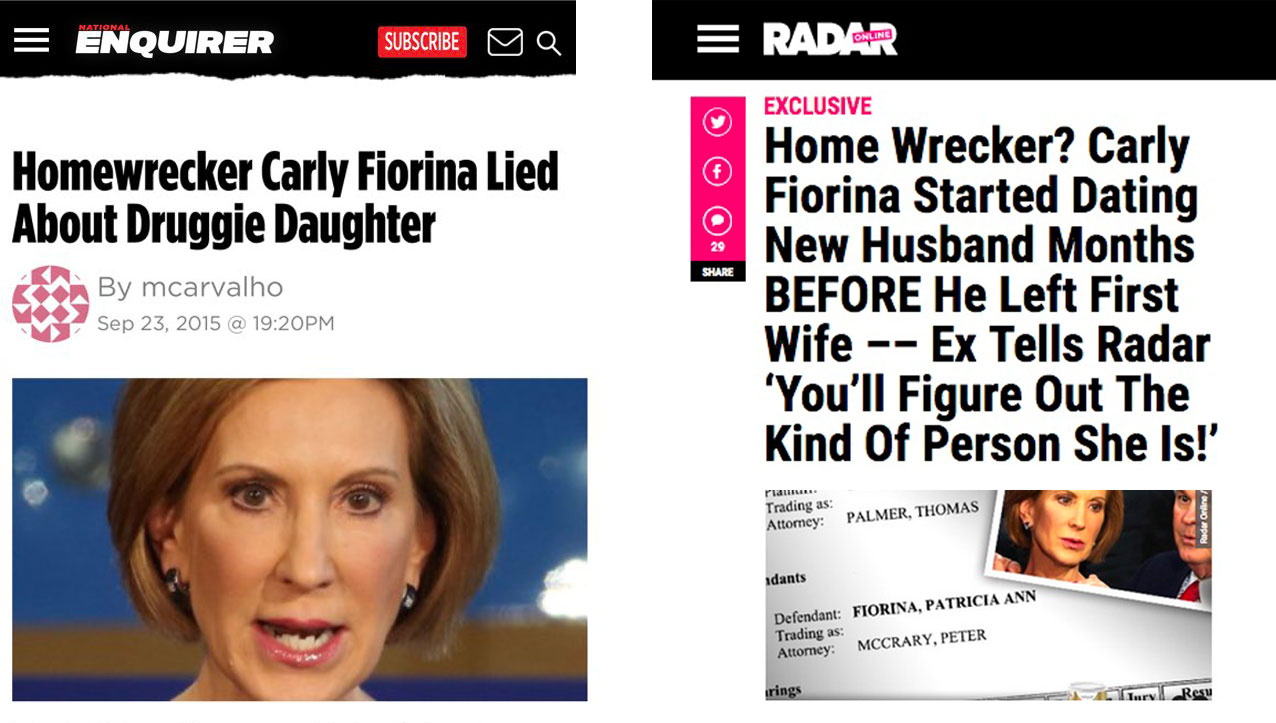
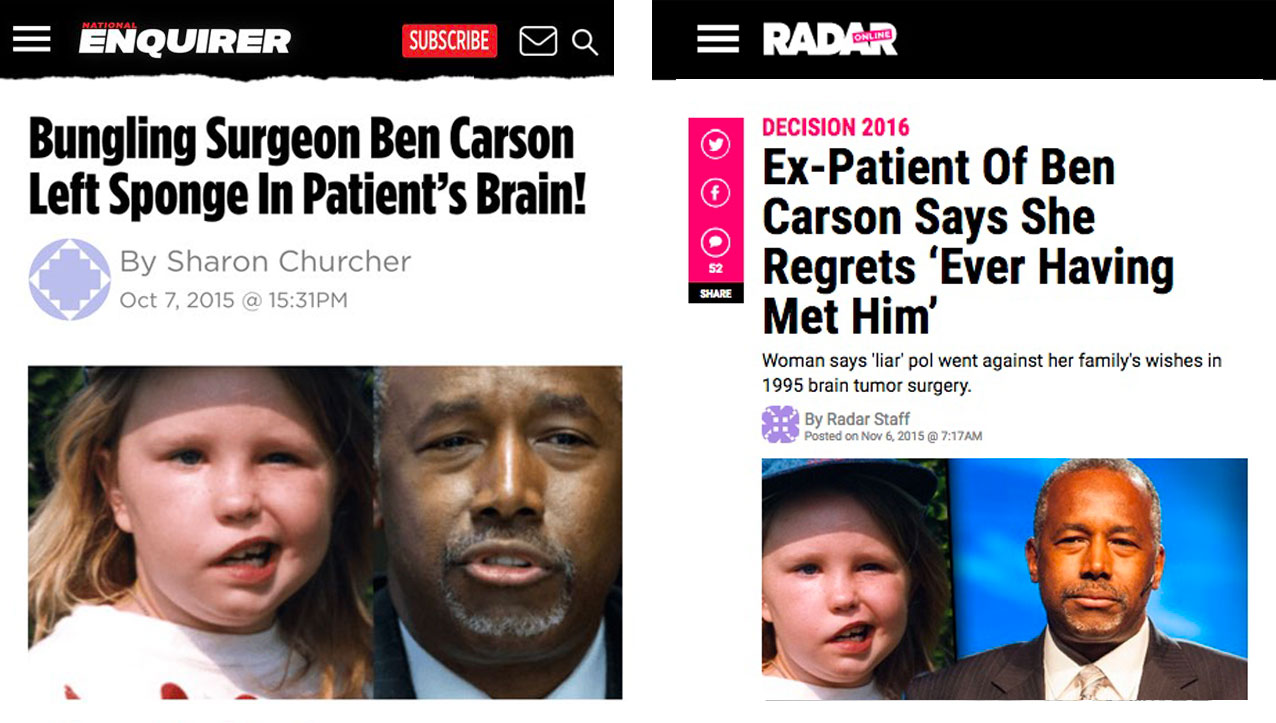
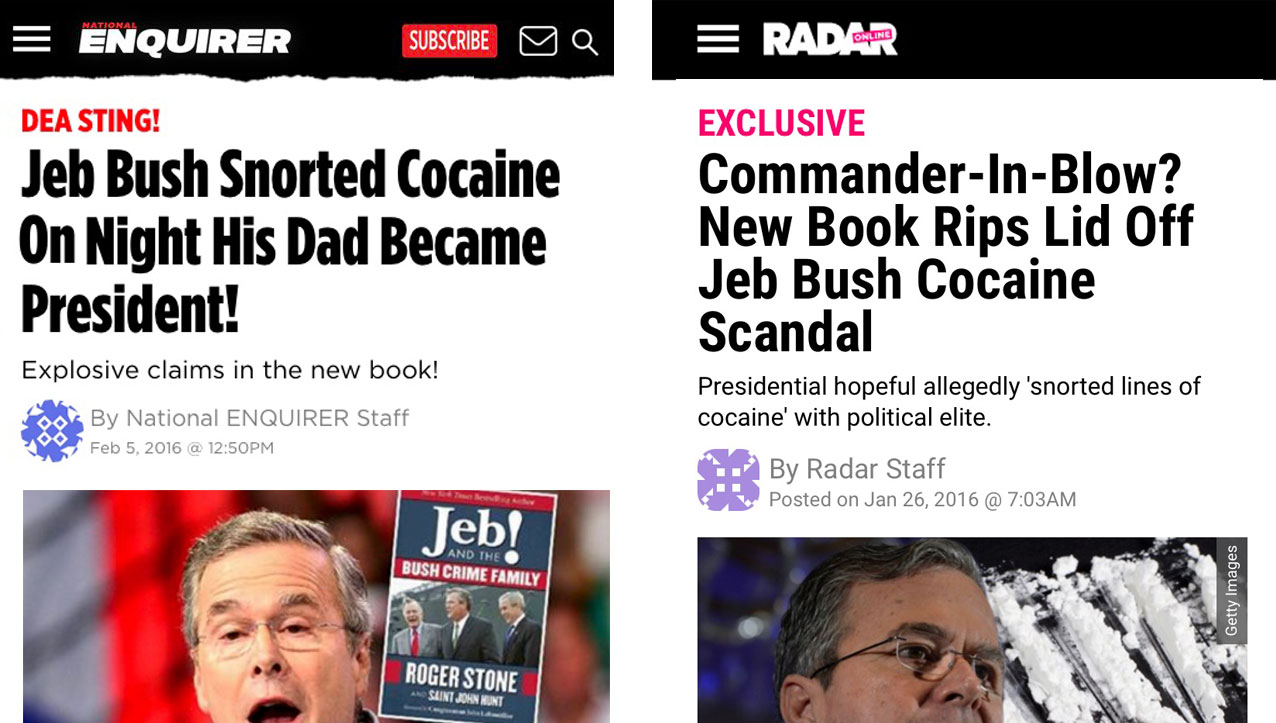
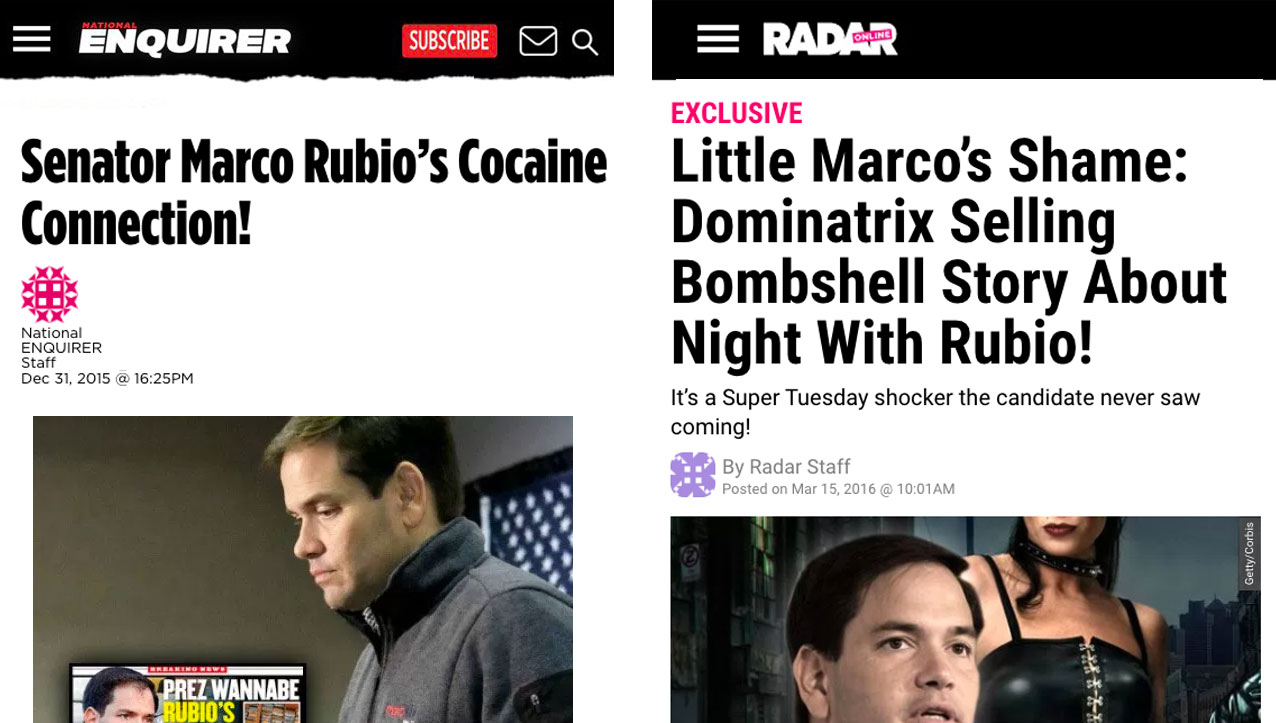
Elsewhere in the series, we explained how AMI used its corporate architecture to hide the story about Donald Trump’s extramarital affair with a former Playboy Playmate – signing her up for a humungous fee, then giving her a series of small, individually unremarkable roles around the company so as not to look too suspicious.
David Pecker is definitely a common factor in this. He’s the chairman who runs the parent company. He’s the one who’s been friends with Trump since the 90s. He’s the one with the flashy title and the big, bushy ‘tache.
But he’s not the only one. Pecker had an accomplice in all of this. AMI’s Chief Content Officer: Dylan Howard.
Howard was first brought into the AMI fold in 2010, where he was installed at RadarOnline as a senior executive editor. He was the one who brought in the Mel Gibson tapes. He was the one reporting on Molly’s Game.
Howard’s hard work was responsible for the sudden ascension of Radar as a formidable force in digital journalism and he was rewarded handsomely in turn with an equally sudden ascension up the corporate ladder.
(NB: There was a short spell during which he took up the editorship at a competing website in 2012, but that was a somewhat fraught time in his life where multiple accusations of inappropriate workplace conduct were levelled against him. AMI hired him back in 2013 though, saying they were satisfied he’d done nothing wrong.)
After taking over as editor of RadarOnline in 2013, Howard would quickly go on to become the company’s Vice President and Chief Content Officer.
This promotion put him in charge of overseeing a huge number of AMI’s titles which, over the years, have included publications like Star, Globe, the National Examiner, OK!, In Touch, US Weekly – as well as RadarOnline and the National Enquirer.
He couldn’t have asked for a more exciting time to be at the company either as Howard was the one with editorial oversight when the company bought the silence of Trump’s former mistress Karen McDougal. He was the one ultimately in charge of commissioning her health and beauty columns across OK!, Star and Radar; and the one who got to greenlight stories about her breast implants almost killing her.
He was also at the helm throughout the 2015/16 Trump campaign when Radar, Globe, the Enquirer and the Examiner all rallied together to co-ordinate their lines on Trump’s rivals – be it challengers in the Republican primary or AMI’s long-standing bête noir, Hillary Clinton.
Which goes some way to explaining why the FBI were quite so interested in talking to him when the suspicious $160,000 hush-money payment was uncovered.
Because Howard isn’t just a words man, or a hack with a good nose for a story. He was quite the dealmaker on the side.

Art Of The Dyl
In January 2015, American Media, Inc. struck a rather eye-opening deal with another media company. The Weinstein Company.
Industry papers were alight with news that Harvey and Bob Weinstein had partnered up with AMI to create a daily TV show about celebrity and entertainment gossip, based and branded around the popular AMI title… RadarOnline.
Not that they had any reason to, but it was curious to note that none of the coverage at the time made any mention of the fact that Harvey Weinstein was Radar‘s earliest investor – getting the entire ball rolling by pumping funds into Maer Roshan’s vision when his own magazine, Talk, collapsed.
But why, a decade after his original investment in Radar, was Harvey suddenly so keen to strike up a deal with it again?
Things became clearer a couple of years later, in 2017, when the #MeToo scandal broke. Harvey Weinstein quickly found himself in the centre of a whirlwind of accusations from over 80 women, saying that they had been harassed, abused, assaulted – even raped – by him.
Shortly after that, the New Yorker revealed that Weinstein had employed a network of spies and media insiders to work within the industry for him to find out who was leaking stories, and to help undermine the women who were trying to speak out about him.
One of the people in Weinstein’s network was none other than Radar Editor-In-Chief, Dylan Howard.
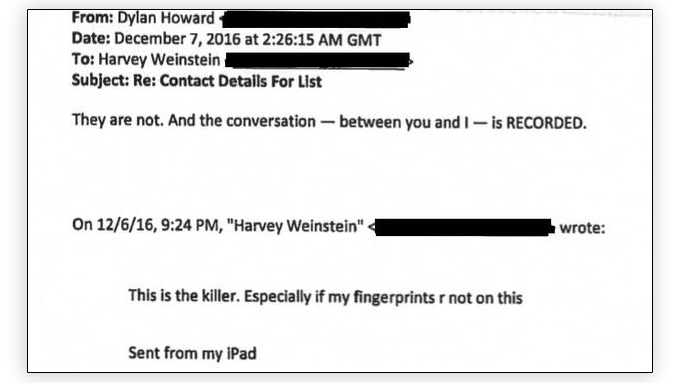
Howard maintains that because of the television deal between the two companies he had “an obligation to protect AMI’s interests by seeking out—but not publishing—truthful information about people who Mr. Weinstein insisted were making false claims against him.”
He also insists that he “resisted Mr. Weinstein’s repeated efforts to have AMI titles publish favorable stories about him or negative articles about his accusers”. A quick glance through some of Radar’s coverage of Weinstein in the two years since the scandal began doesn’t do much to substantiate that claim.
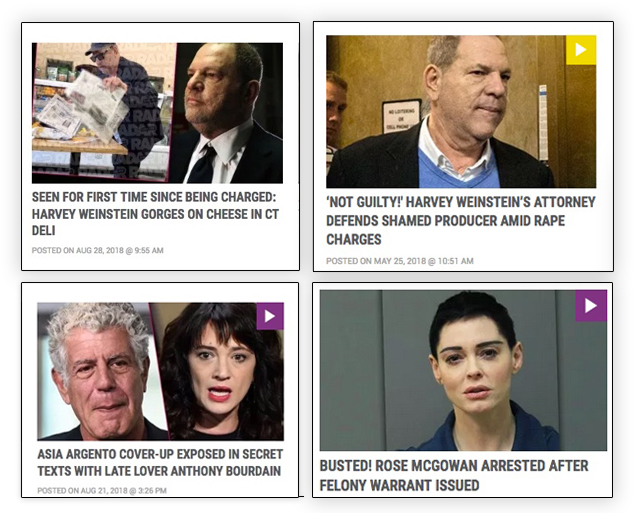
Obviously none of this was enough to stem the tide. The Weinstein Company – already struggling – was absolutely destroyed as a result of the wider shitstorm his serial sexual assaults rained down upon him. Weinstein was fired from his company, four of his board members resigned and the company would declare bankruptcy within six months.
Still, there was one definite bright spot to being an alumnus of the Radar Investors Group. It had connected Harvey with Ron Burkle, who stepped in with an offer to buy up what remained of the Weinstein Company. (A deal which, perhaps understandably, fell through at the last moment.)
It even worked out relatively well for the convicted paedophile Jeffrey Epstein. Thanks to his historic ties to Trump, he managed to get some oddly neutral coverage on RadarOnline in his final years – used mainly as a way to imply that Trump was the target of a grossly fabricated political stitch-up…
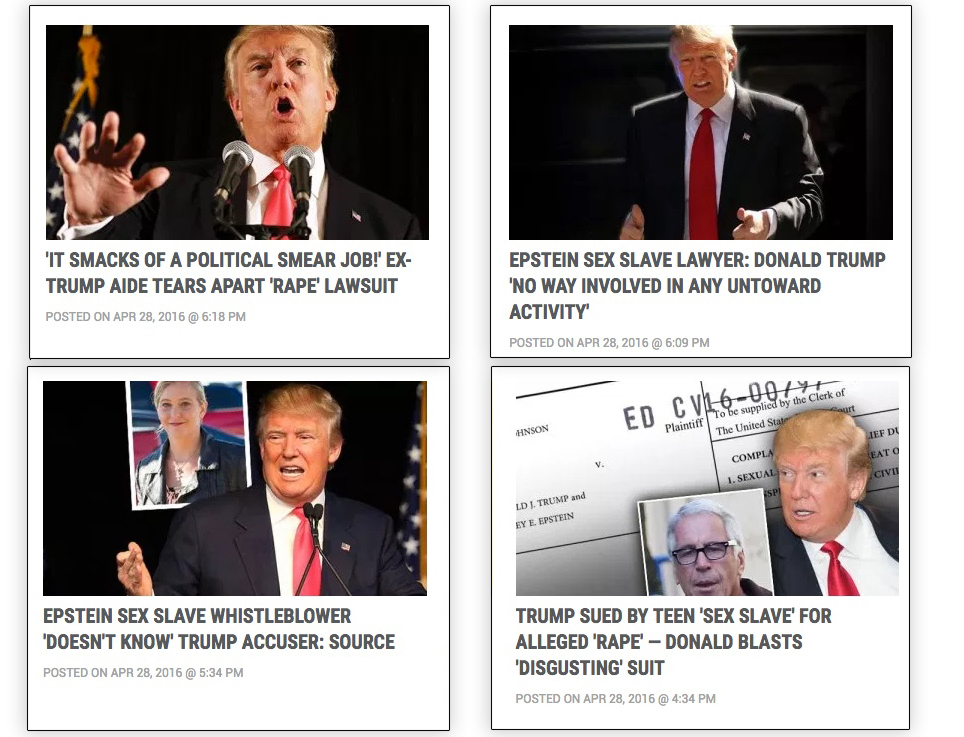
…but also as a watertight way to bash Bill and Hillary Clinton.
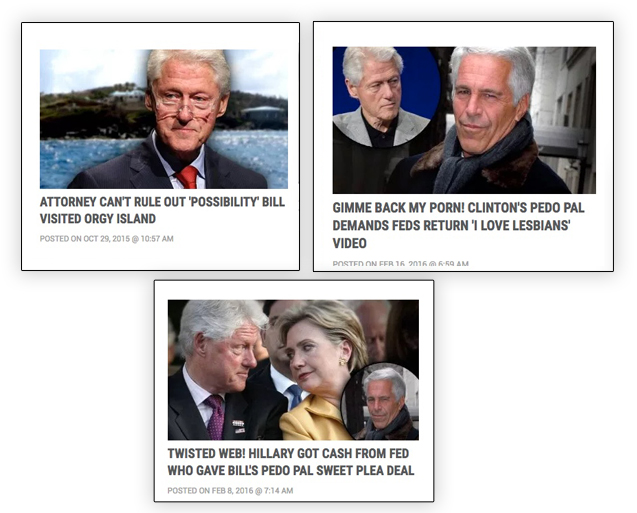
And what sort of coverage does Ron Burkle get in Radar, you ask? Well, as a junior investor in AMI’s RadarOnline, he can rest assured that a media property he still has a stake in won’t go turning him over too hard anytime soon.

Howard’s End
Dylan Howard’s most prominent stab at dealmaking however came at the start of this year: 2019. Just as the FBI investigation looked to be rolling straight past him, Howard went and did something utterly ridiculous – sparking of a fresh new scandal that rocked AMI to its core.
He attempted to blackmail the richest man in the universe over a set of dick pics.
The story is likely indelibly seared in your skull, given the level of detail we were all subjected to at the time, but what happened was that Amazon boss Jeff Bezos was caught conducting an extramarital affair with a woman named Lauren Sanchez. As part of that affair, Jeff Bezos had sent her a series of photos. Photos of his dick both in and out of his pants, as well as an unsettling sounding one which Howard described in his extortion attempt as showing “his semi-erect manhood … penetrating the zipper”
Getting the chance to blackmail the richest man in the world might seem like a good opportunity for a gigantic payday, but slightly complicating the matter is that Jeff Bezos is also a billionaire with significant interests in the media himself.
For not only does Amazon sell millions of books, magazines, e-readers, audiobooks and many other media products, Jeff Bezos also owns the Washington Post – an American newspaper of record, which has been antagonising Trump to his wits’ end. So he was well-armed to fight back.
Naturally, the story became massive. An almighty clash of media titans, both getting caught with their trousers down (one literal; one metaphorical). A tale that combines a billionaire’s soft-lob with an underhanded blackmail scheme is perfect tabloid fodder. It was just unfortunate for Dylan Howard that he soon became the primary focus of it – unexpectedly upstaging Jeff Bezos’s junk.
The negative publicity that the Bezos Blackmail story generated for AMI proved a disaster too far.
The hedge fund that had acquired 80% of AMI’s stock, Chatham Asset Management, put its foot down – claiming that the Enquirer brand had become too toxic and was damaging the value of the company at large.
AMI had been put in a bind. It was being forced to sell off its flagship title. So, bundling the National Enquirer up with Globe Magazine and the National Examiner (the other magazines that had been relentless in their negative election coverage of Trump’s Republican rivals and the Clintons) the jewel in AMI’s crown was put on the market.
Dylan Howard has since been quietly sidelined from is day-to-day operations at AMI while its reputation recuperates. His office has reportedly been converted into a podcast studio, while he has just signed a staggering publishing contract in which he appears to be due to publish a true crime book once a month for the next few years – so he is going to be a little preoccupied anyhow.
But where does that all leave AMI?
Back when we wrote the National Enquirer series, we told you to keep an eye on the Enquirer‘s coverage as it was going to be one of the best bellwethers for Trump’s popularity on the ground. Sadly, because a succession of millionaires and billionaires – from Weinstein, to Epstein, to Trump, to Bezos – have failed to keep their cocks tucked, that is no longer the case.
The National Enquirer has been sold to James Cohen of the Hudson News Group. The only title that still remains from AMI’s almighty election onslaught in 2016 is Radar – but since then, Radar’s standing has taken some serious damage too.
Harvey Weinstein – its initial investor – lies wounded, his reputation in tatters.
Jeffrey Epstein – its second investor – lies dead, his reputation in tatters and pissed on.
Dylan Howard – its Editor-In-Chief – is disgraced, cut loose to write pulpy books about Princess Diana’s death.
Ron Burkle is still left standing, of course, and his hand is still in his pocket with his investment. But Burkle causes a couple of complications.
All things being well, 2020 will see a new American election. If he survives impeachment, it looks likely that Donald Trump will run again for a second term. As a friend of Pecker (an ‘FOP’ as they’re known in-house at American Media) Trump can be relatively sure he won’t get savaged in any Pecker-owned publication. But as the National Enquirer is no longer Pecker-owned, there’s no telling what might happen.
The AMI arsenal has become sorely diminished. And while Pecker grapples with that, on the quiet, there’s been a new protected class emerging in the corridors of American Media, Inc: The ‘FOB’. The Friend of Burkle.
Though he may only be a junior investor in RadarOnline, his influence there is still sizeable. He too has the power to kill stories that might upset and embarrass his friends – and his connections, wealth and relative lack of current scandal may even be giving him the upper hand on the currently wounded Pecker.
The trouble for AMI is that a lot of Burkle’s friends tend to be Democrats: including Nancy Pelosi, the Speaker of the House who is in charge of Trump’s impeachment hearings. If they’re the ones who are so inclined to call in a favour from Burkle during campaign season, it’s going to put Radar – AMI’s last great hope at political influence – in a sticky spot.
Democrats will just have to hope and pray that their man on the inside – the billionaire who co-owned a shag pad with Leonardo DiCaprio, took regular dinners at Jeffrey Epstein’s house and flies a plane called Air Fuck One – can stay out of trouble for the next 12 months.




